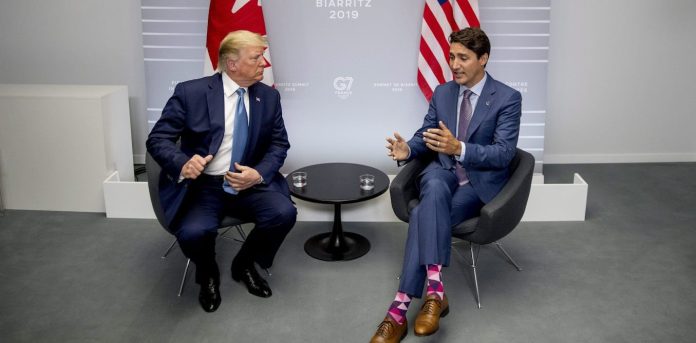Trump tariffs: What the president-elect’s rhetoric tells us about how Canada could be affected — again
Donald Trump is known for his often outlandish rhetoric. The president-elect of the United States regularly makes public statements that are exaggerations, or vows to take action but fails to do so, which is not necessarily bad.
Consider an example of when he’s backed up his rhetoric with action. In April 2017, Trump said that other nations were “dumping vast amounts of steel all over the United States, which essentially is killing our steelworkers and steel companies.”
While this statement — and several others Trump made when president the first time — appeared to be an exaggeration, it wasn’t empty rhetoric.
In March 2018, the Trump administration imposed a short-lived 25 per cent tariff on steel imports from Canada and other countries. The administration stated these imports threatened American “national security.” Again, this accusation seemed unfounded but likely served to stir up fear and justify Trump’s actions.
In fact, the government of Canada called this framing “inconceivable and completely unacceptable,” while Prime Minister Justin Trudeau described it as “insulting” to Canada.
In response, Canada imposed a 25 per cent retaliatory tariff on American steel and everyday items, including lawnmowers, washing machines and whisky.
Harsh words on Canadian steel
The Trump administration’s rhetoric on Canadian steel was largely inexplicable. But it has provided a hint of what might lie ahead in a second Trump presidency based on his campaign threats to impose tariffs on all imports in an apparent attempt to boost American manufacturing.
Canada is the largest buyer of American steel amid the long-standing trade partnership between both countries.
So by imposing a tariff on Canadian steel and igniting a reciprocal Canadian tariff the next day, Trump’s decision seemed economically unwise. His administration lifted the tariffs a year later, although imposed smaller tariffs again in 2020.
The National Technology and Industrial Base — consisting of people and organizations engaged in national security among key western nations, including Canada and the United States — recognizes Canada as one of the five ally countries in terms of American defence. Accusing Canadian steel of representing a threat to national security was therefore questionable — and an example of Trump’s use of sometimes baseless rhetoric.
This tariff-truce cycle wasn’t just a one-off occurrence under Trump, incidentally — it played out six times before the 2018-2019 steel tariffs in various industries and as recently as August 2024 under President Joe Biden’s administration.
However, Trump’s rhetoric on Canadian steel seven years ago — and his more recent public remarks on broader tariffs — is largely unprecedented, and is a vivid illustration of political theatre. Trump makes bold statements and promises, and he may or may not ultimately act on them.
But even though his actions against political adversaries may be long-lasting and strategic, his first presidency suggests his actions and words against Canada will probably be short-lived and tactical.
How Canada can prepare
Will Trump make similar statements against Canada in his second administration? It’s almost certain he will.
Trump said during the campaign that Canada had a “large faucet,” and claimed falsely that if turned on, it could divert water that’s “aimlessly” being poured into the Pacific.
How should Canada prepare?
Ideally, leaders talk to each other and resolve disagreements in an effort to avoid trade wars that hurt both countries. But that kind of engagement is far from guaranteed in another Trump administration.
Trump’s repeated use of rhetoric as political theatre means that most of his counterparts in other countries, including Trudeau, now recognize that retaliating with countermeasures, trying to be muted in their own rhetoric and hoping for a truce a few months later is the best way to handle him.
Trump’s past comments on Trudeau have varied from “nice guy” to “dishonest” and “two-faced.”
In response, Trudeau’s comments on Trump have varied from neutral to negative in a private conversation with other world leaders that was caught on camera.
While Trump’s rhetoric is now familiar, the Canada-U.S. relationship will unfold differently in a second Trump presidency. The president-elect takes power in January 2025, while Trudeau will seek re-election in October 2025 or earlier, and polls are suggesting the Liberals will lose to the Conservatives.
Given Pierre Poilievre’s own penchant for overly dramatic rhetoric, the potential relationship between the Conservative leader and Trump could result in super-charged political theatre.
Whoever’s governing Canada over the next four years must prepare for how to respond to — and preferably, pre-empt — Trump’s rhetoric and ensuing actions in a way that preserves and promotes Canadian interests.![]()
Vivek Astvansh, Associate Professor of Quantitative Marketing and Analytics, McGill University
This article is republished from The Conversation under a Creative Commons license. Read the original article.



